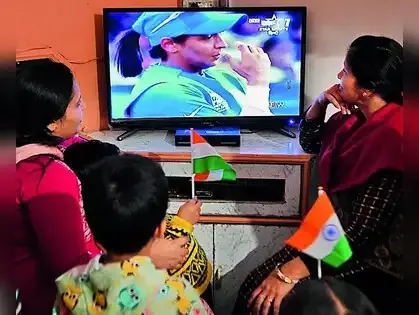The Indian women's cricket team's brilliant victory in the ICC World Cup led to several interesting comments from the world I inhabit. This world includes pot-bellied, well-meaning Indian men in their 40s, steeped in mid-life conundrums and ever-evolving gender politics, unsure of what the right supportive thing to say is.
Some of these men are commentators, looking for the right phrasing to give the women's cricket game equal stature to the men's, but end up asking the women cricketers things like: 'Do you think this is a watershed moment for women's cricket in India?' What they are really asking is, 'Aren't you shocked at the popularity of this?!'
If someone asked the Indian men's Test and ODI captain Shubman Gill after a victory, 'Do you think this will popularise the sport among Indian men?' it would be seen as a prank.
I'll give you this. I'm in that middle Gen X that is sensitive to language around women's sport and its well-deserved popularity now. I'm not the gone-case generation of uncles who would say, and still say, insane things like: 'For women, they play pretty good cricket, no?' Or the even crazier, 'It's not cricket-cricket. But still, good to see them trying.' Language that can, and should, get you murdered in 2025.
Neither am I part of Gen Z and below, who would take offence at any compliment to the game from men my age, seeing it as suspiciously regressive and dated. A friend wrote on Facebook, 'Jemimah Rodrigues' epic innings reminds me of a female Vivian Richards.' Perfectly harmless. To which a friend's daughter commented, 'Ugh. Uncle, why add female as if it's a handicap? Why not just say it reminds you of Vivian Richards? #Cringe.' And another teen wrote, 'LOL, stop with the dad jokes,' when clearly no joke was intended. It is a tightrope.
I've found myself in a bit of a soup when I casually mentioned to young people that watching the women's World Cup felt gentler, kinder, softer, and less aggressive than the men's game. To which I was immediately told that I'm stereotyping, and suggesting that women are softer, kinder, gentler. Seen clearly as somehow inferior things compared to Suryakumar Yadav or Virat Kohli shouting and screaming and thumping their chests, and then losing their wicket and beard hair for under 5.
I backtracked and tried to save myself by saying something nonsensical like, 'No, no, I meant Smriti Mandhana and Harmanpreet Kaur can be angry and gentle - both! - which Kohli or SKY can't,' and retreated into a shell of shame, feeling like a gone-case uncle, when all I intended was praise.
It's undeniably excellent that when you type in 'India cricket captain' in Google now, both Gill and Kaur pop up, a monumental advancement of society. And through incredible victories like this recent one, stars of the women's game are already (alongside MS Dhoni, Virat Kohli, and Rohit Sharma) selling us everything from deodorant to 2-wheelers to life insurance, indicating they are brands themselves, and household Indian names. A far cry from an era when the women's game was patronised and programmed as duty, not competitive, with a huge fan base like today, as one saw at a sold-out DY Patil Stadium.
Still, the language from well-meaning middle-aged men needs to catch up with the popularity. Too much praise is also frowned upon. Another friend on social media wrote, 'Are you telling me Jemima Rodrigues can play the guitar and has played national-level hockey and cricket when most of the men's cricket team haven't even finished school?' To which a 20-something replied, 'Uncle, don't be a misandrist.' Yes, the word means 'a hatred of men'.
Perhaps, the best way to praise and understand a new phenomenon is not to differentiate it. As an Indian woman cricketer sensibly explained to me, 'Why can't you just say that was a great game of cricket? Why bring gender into it at all?'
Some of these men are commentators, looking for the right phrasing to give the women's cricket game equal stature to the men's, but end up asking the women cricketers things like: 'Do you think this is a watershed moment for women's cricket in India?' What they are really asking is, 'Aren't you shocked at the popularity of this?!'
If someone asked the Indian men's Test and ODI captain Shubman Gill after a victory, 'Do you think this will popularise the sport among Indian men?' it would be seen as a prank.
I'll give you this. I'm in that middle Gen X that is sensitive to language around women's sport and its well-deserved popularity now. I'm not the gone-case generation of uncles who would say, and still say, insane things like: 'For women, they play pretty good cricket, no?' Or the even crazier, 'It's not cricket-cricket. But still, good to see them trying.' Language that can, and should, get you murdered in 2025.
Neither am I part of Gen Z and below, who would take offence at any compliment to the game from men my age, seeing it as suspiciously regressive and dated. A friend wrote on Facebook, 'Jemimah Rodrigues' epic innings reminds me of a female Vivian Richards.' Perfectly harmless. To which a friend's daughter commented, 'Ugh. Uncle, why add female as if it's a handicap? Why not just say it reminds you of Vivian Richards? #Cringe.' And another teen wrote, 'LOL, stop with the dad jokes,' when clearly no joke was intended. It is a tightrope.
I've found myself in a bit of a soup when I casually mentioned to young people that watching the women's World Cup felt gentler, kinder, softer, and less aggressive than the men's game. To which I was immediately told that I'm stereotyping, and suggesting that women are softer, kinder, gentler. Seen clearly as somehow inferior things compared to Suryakumar Yadav or Virat Kohli shouting and screaming and thumping their chests, and then losing their wicket and beard hair for under 5.
I backtracked and tried to save myself by saying something nonsensical like, 'No, no, I meant Smriti Mandhana and Harmanpreet Kaur can be angry and gentle - both! - which Kohli or SKY can't,' and retreated into a shell of shame, feeling like a gone-case uncle, when all I intended was praise.
It's undeniably excellent that when you type in 'India cricket captain' in Google now, both Gill and Kaur pop up, a monumental advancement of society. And through incredible victories like this recent one, stars of the women's game are already (alongside MS Dhoni, Virat Kohli, and Rohit Sharma) selling us everything from deodorant to 2-wheelers to life insurance, indicating they are brands themselves, and household Indian names. A far cry from an era when the women's game was patronised and programmed as duty, not competitive, with a huge fan base like today, as one saw at a sold-out DY Patil Stadium.
Still, the language from well-meaning middle-aged men needs to catch up with the popularity. Too much praise is also frowned upon. Another friend on social media wrote, 'Are you telling me Jemima Rodrigues can play the guitar and has played national-level hockey and cricket when most of the men's cricket team haven't even finished school?' To which a 20-something replied, 'Uncle, don't be a misandrist.' Yes, the word means 'a hatred of men'.
Perhaps, the best way to praise and understand a new phenomenon is not to differentiate it. As an Indian woman cricketer sensibly explained to me, 'Why can't you just say that was a great game of cricket? Why bring gender into it at all?'
(Disclaimer: The opinions expressed in this column are that of the writer. The facts and opinions expressed here do not reflect the views of www.economictimes.com.)






Anuvab Pal
Anubav Pal is an Indian stand up comedian, screenwriter, playwright and novelist